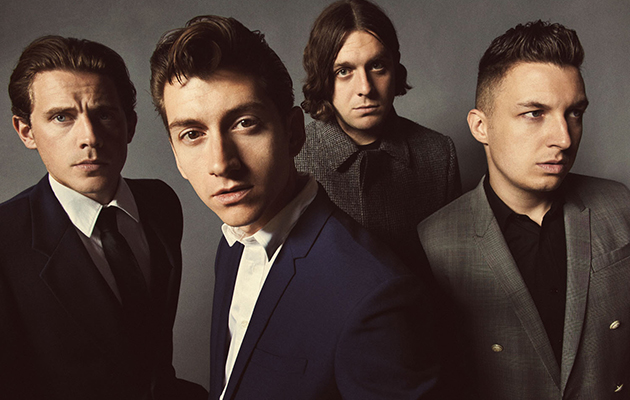Like us on Facebook to keep up to date with the latest news from Uncut Originally published in Uncut's June 2014 issue (Take 205) Five excellent albums. An inflammatory speech on the future of rock’n’roll. America for the taking. And now, this month in London, their biggest ever gigs… Has th...
Two days after his Brits appearance, Alex Turner escorts one journalist out (“I want to make sure he goes…” he smirks), declines a cigarette break, and returns to his seat in the bar/restaurant of a swish central London hotel. A jetlagged rock’n’roller (like the other members of his band, he is now based in Los Angeles), Turner has been up since 5am researching vintage motorcycles and emailing his soundman about a possible microphone configuration (“Diagrams, the lot”). He is dressed – biker boots, biker jacket, Ray-Bans – to menace society in 1961.
He talks a little differently to how you may remember. Once a witty and self-effacing artful dodger, these days Turner is tempered by an ironic detachment that occasionally stops him in his tracks. His recent speech, rather than an embarrassment to him, proves to be the tip of the iceberg, the establishing shot in a well-scripted screenplay about the possibilities of what his music is all about.
“I don’t step up to accept a trophy for a race I didn’t know I was running,” he begins, “and act as though it’s something I’ve been dreaming of since I was a little boy, because it’s not the truth.
“If that is the truth for you, fine,” he continues, “but it’s not ever been about that – I think any sort of victory in this trek comes with the conception of a song or an idea, not with a trophy or a pat on the back.”
Rock’n’roll, as Turner tells it, is Johnny Burnette. It’s Ike and Tina Turner. It’s Bowie and The Beatles. More often than not, it’s a music that he describes in philosophical terms: absolutely more about the journey than the getting there; more about the chase than the catch. Such is rock’n’roll’s elusive nature, it’s something about which you need to have faith, and beware false idols. Turner talks the talk, but all of Arctic Monkeys walk the walk with him.
“Attitude is part of it,” says guitarist Jamie Cook, “but it can only take you so far.”
“People can have a rock’n’roll attitude and never be in a band,” remarks drummer Matt Helders. “You can dress like it.”
“It’s easier to say what it isn’t…” Turner continues, “…a haircut or a belt buckle. It doesn’t even occur to some people that there is a rock’n’roll – so me saying that might give someone an idea. It’s a beacon in your peripheral vision. You can’t draw someone a map to it.”
________________________
Aware of this elusive ideal, for the last decade the Arctic Monkeys have followed their instincts to the ends of their own charted territory, and it has changed them. Once a mad scramble, a rush of information, an Arctic Monkeys live show has become a dramatic and finely tuned series of reveals, their accomplishment measured by their comfortable command of a large crowd. You may have witnessed their poise at Glastonbury 2013. This month, they will play two shows at London’s Finsbury Park, where they will play to 100,000 people.
“We’ve always played to the ends of our abilities,” explains Matt Helders. “Back then, we were just doing what we could. Where we are now, we’re more confident we can entertain people.”
“Ten years ago it was tightly wound,” says Turner. “It was pure energy. But as time went on we realised that you can’t really fake that energy, so we were going to have to figure out another way around it.”
That way has been to become more considered, and dramatic. At the centre of this is Turner himself, now a showman of considerable accomplishment. No longer the diffident frontman of 2006 (this was someone who opened up their first promo video instructing viewers, “Don’t believe the hype…”), Turner’s persona is now, depending on who you talk to, “collar up” (according to AM co-producer Ross Orton) or “cocky” (producer James Ford). “He has more fun with it,” says Matt Helders. As Turner perceives it, there’s no real change in what he does. “Even putting on a trackie top to do a show back then was as contrived as me doing me quiff now,” he says. “You can’t get up onstage in front of any amount of people without putting on an act. Otherwise I wouldn’t be able to do it. Speaking without a load of songs in front of you… That’s almost my worst nightmare. I don’t like being the centre of attention.”
“I think a lot of people give him some stick about trying to be a character or whatever, because he started off as this quietly cocky northerner,” says Nick O’ Malley. “I think a lot of people would have liked him to continue doing that. But it would be doing my head in by now if he were trying to be Mr Yorkshireman every night.
“Personally, I’ve always liked frontmen who seem like they’re from another planet,” says O’Malley, “like David Bowie or Nick Cave – it’s more interesting watching that than watching someone be themselves. I think he’s getting more into that – he puts on a performance and is grander with his expression. I’m all for that.”
Change is what Arctic Monkeys are all about. As Turner explains, it’s what he admires in other artists (“The Beatles, David Bowie… the big ones”). Duly, the poise and drama of their shows and current music hasn’t happened overnight, but is part of their DNA, their gradual evolution over the past 10 years. Nor is their journey over.
“It feels like a quest,” says Alex Turner. “It doesn’t feel like there’s a beginning or end to this thing.”



